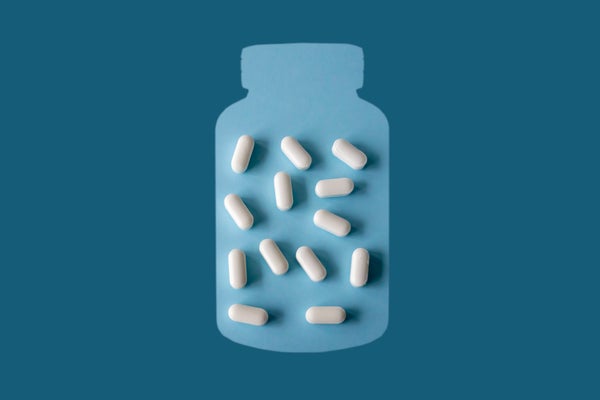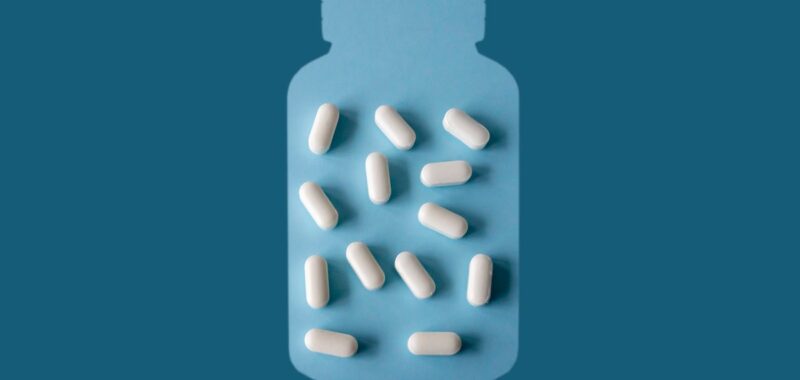Ozempic Shots Have Taken Off. Why Haven’t GLP-1 Pills?
Some experts say oral versions of popular weight-loss drugs such as Wegovy could offer people more flexibility and accessibility. What’s keeping the pills from taking off?

Anastasiia Zabolotna/Getty Images
Popular weight-loss and type 2 diabetes drugs such as Wegovy and Ozempic are typically taken as self-administered injections—a bearable albeit unpleasant jab to the abdomen or thigh. But drug manufacturers and researchers recognize the perks of pills.
An oral version of these drugs—which are known as glucagon-like peptide 1 (GLP-1) receptor agonists—could be more accessible and would come without the inconvenience, pain or medical waste of shots. But an assortment of scientific and logistical obstacles is preventing GLP-1 pills from taking off in the same way that the injectable forms of these drugs have. Pfizer recently announced it decided to discontinue clinical trials of its oral GLP-1 medication for weight loss, called danuglipron, after a study participant experienced a liver injury that was potentially linked to the experimental drug. A pill version of semaglutide—the generic name for Novo Nordisk’s diabetes drug Ozempic and its weight-loss version Wegovy—was approved by the Food and Drug Administration as a type 2 diabetes treatment in 2019, but it has largely flown under the radar.
What do we know about these oral GLP-1 drugs, and what’s holding them back?
On supporting science journalism
If you’re enjoying this article, consider supporting our award-winning journalism by subscribing. By purchasing a subscription you are helping to ensure the future of impactful stories about the discoveries and ideas shaping our world today.
Unlike the array of new injectable GLP-1 drugs, there is only one oral GLP-1 medicine that is currently on the market: Novo Nordisk’s Rybelsus. This semaglutide pill mimics the gut hormone GLP-1 in the same way the injections do, and it must be taken daily compared with Ozempic’s once-weekly injections. Rybelsus is approved for type 2 diabetes but not for weight loss, which is likely part of the reason it has garnered less attention, says Reshmi Srinath, an endocrinologist and director of the weight and metabolism program at Mount Sinai Health System. Rybelsus is typically prescribed to people with type 2 diabetes who have persistently high blood sugar but “are sort of opposed to using injections,” she says.
Although there are currently no FDA-approved oral GLP-1 medications for weight loss, early data from clinical trials hint that a pill form could be as effective as its injectable counterparts. In one 2023 study funded by Novo Nordisk, scientists found that participants without type 2 diabetes who took oral semaglutide every day for 68 weeks lost an average of 15 percent of their body weight. Participants who took a placebo lost an average of 2.4 percent. In a 2021 study, adults who were considered to be overweight or to be living with obesity (who also did not have diabetes) were treated with once-weekly semaglutide or placebo injections. It showed similar results: participants who took the drug lost an average of 15 percent of body weight lost, whereas those who took the placebo lost an average of just 2.4 percent. “The safety and efficacy of oral semaglutide has not been compared to injectable semaglutide in a head-to-head clinical trial,” a Novo Nordisk spokesperson told Scientific American.
Other health benefits from injectable GLP-1 medications might also carry over to pills. A recent study that was published in the New England Journal of Medicine (and also funded by Novo Nordisk) evaluated about 10,000 participants who had type 2 diabetes and also atherosclerosis or chronic kidney disease, or both. Taking oral semaglutide was associated with a significantly lower risk of heart attack and stroke among participants compared with taking a placebo. The recent NEJM findings suggest GLP-1 pills can provide health improvements that are “directly in line with what we’ve seen in the other injectable GLP-1 receptor agonists,” says Matthew Cavender, a study co-author and a cardiologist at the University of North Carolina School of Medicine.
Injectable GLP-1 drugs are shot into subcutaneous fat and released slowly into the bloodstream, whereas pills are ingested and must avoid being broken down in the gastrointestinal tract. This challenge is why some scientists question whether oral GLP-1 drugs can be as potent as injectables, Cavender says. Rybelsus, however, is formulated with a special molecule that helps it to quickly pass through the stomach lining. Some of the medication will break down, he adds, but enough will make it across to result in health improvements. For full effectiveness, drug manufacturers recommend that people take the pill on an empty stomach and refrain from eating for 30 minutes after they take it.
Like their injectable versions, GLP-1 pills can cause gastrointestinal issues. In the 2023 study, 80 percent of participants who took oral semaglutide for weight loss experienced gastrointestinal problems compared with 46 percent of those who took a placebo. The 2021 study found that 74 percent of injectable semaglutide users experienced gastrointestinal side effects versus 48 percent of those on placebo.
Eli Lilly, the manufacturer of the injectable weight-loss medication Zepbound, has its own oral GLP-1 drug in the pipeline, orforglipron, which is being investigated as a treatment for both type 2 diabetes and obesity. Like Rybelsus, orforglipron would be a daily pill—but it wouldn’t have meal-timing restrictions. Early data show that people lose between 10 and 15 percent of their body weight after 36 weeks on the drug. Another recently completed phase 3 clinical trial of people with type 2 diabetes showed the oral medication was also effective at lowering blood glucose levels. Eli Lilly plans to begin orforglipron’s review process for regulatory approval for weight loss in 2025 and for type 2 diabetes in 2026.
In a response to questions about Pfizer ending the trial of its oral drug, a company spokesperson pointed Scientific American to the press release that announced that decision and said Pfizer is working on other early-stage oral drug candidates for weight loss, including one that works on a similar hormone to GLP-1 that is currently in phase 2 clinical trials.
More forms of GLP-1 medication are a good thing overall, Srinath says, because they give more options to people seeking treatment. And pills are generally cheaper for pharmaceutical manufacturers to produce than injectable medications, which could potentially translate to lower costs for consumers.
But the introduction of new oral drugs raises a lot of new questions as well, Cavender says. Do different pills require different dosing strategies? How does that change in people who may have multiple health concerns? “We’ve got to figure out what’s the right way of [providing GLP-1 pills] in all these different circumstances,” he says.

